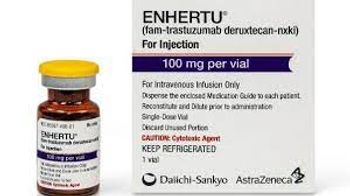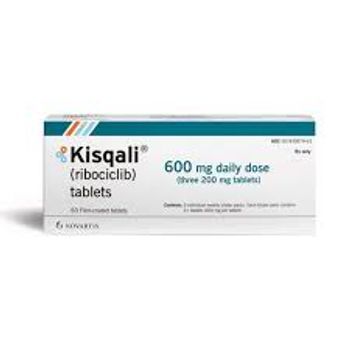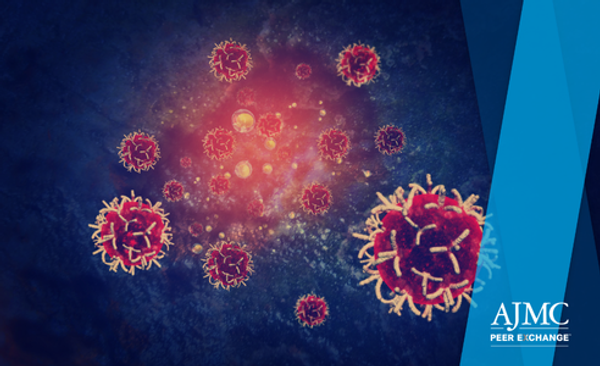
Breast Cancer
Latest News


FDA Expands Abemaciclib Indication in HR+/HER2–, Node+, High-Risk Breast Cancer
Latest Videos

CME Content
More News

The approval came exactly 2 months after results from the landmark DESTINY-Breast04 trial showed that the antibody drug conjugate reduced the risk of disease progression or death by 50% compared with chemotherapy for HER2-low patients with both hormone receptor (HR)–positive and HR-negative disease.

Hope S. Rugo, MD, FASCO, is professor of medicine and the director of the Breast Oncology and Clinical Trials Education program at the University of California San Francisco Helen Diller Family Comprehensive Cancer Center. She discusses her experience with palbociclib and letrozole in advanced breast cancer.

Debra Patt, MD, PhD, MBA, executive vice president of Texas Oncology, discusses how community oncology practices have heightened their outreach efforts to entice patients back in for cancer screenings and the importance of thinking outside the box to overcome staffing shortages in the oncology space.

Officials from Novartis emphasized that the ribociclib-fulvestrant combination is the only one in the CDK4/6 inhibitor class to demonstrate an overall survival benefit when used in a first-line setting among postmenopausal women.

This approval of trastuzumab deruxtecan (Enhertu) follows the March release of data from the DESTINY-Breast03 trial on the anti-HER2 monoclonal antibody, also a HER2-directed antibody-drug conjugate, which indicated superior outcomes vs trastuzumab emtansine.

The intent of metastatic disease treatment is palliative, not curative, so we try to prolong life and provide quality of life as much as we can, said Hatem Soliman, MD, medical director of the Clinical Trials Office, Moffitt Cancer Center.

To achieve health equity, experts from CVS Health discuss why we must invest in programs that improve access to health care for historically marginalized communities, address social determinants, boost health education, increase representation in all levels of health care delivery, widen access to clinical trial research, and more.

The financial toxicity of newer metastatic breast cancer (MBC) treatments is a significant concern and requires stakeholders to work together to find the best value- and evidence-based treatments for patients, said Hatem Soliman, MD, medical director, Clinical Trials Office, Moffitt Cancer Center.

Debra Patt, MD, PhD, MBA, executive vice president of Texas Oncology, addresses how the pandemic may have influenced cancer screening and diagnosis rates.

This investigation focused on use of additional services and incidence of new diagnoses among women who underwent a breast cancer screening MRI—having a low or average risk of the cancer—compared with a matched cohort who underwent mammography.

Debra Patt, MD, PhD, MBA, executive vice president of Texas Oncology, addresses considerations for getting a second COVID-19 booster, or a fourth dose, among survivors of breast cancer or patients currently undergoing treatment as well as those who may be immunocompromised.

This new study used data on women with stage 0 to II breast cancer to investigate their long-term quality of life (QOL) as it related to choice of surgery and the decision to undergo adjuvant radiation therapy.

This subanalysis of data from the ECOG-ACRIN E5103 trial evaluated longer-term quality of life (QOL) at the 18-month mark among patients with lymph node–positive or high-risk lymph node–negative breast cancer (BC) who have completed active treatment.

Debra Patt, MD, PhD, MBA, executive vice president of Texas Oncology, explains recommendations for annual mammography screenings after COVID-19 vaccination and why guidelines differ for diagnostic visits.

NCCN guidelines are no longer “a group of monotherapy choices,” but selections that feature partners for endocrine therapy, highlighted William J. Gradishar, MD, of the Robert H. Lurie Comprehensive Cancer Center of Northwestern University.

In this new study from Norway, artificial intelligence (AI) was used with mammography screenings to predict risk of breast cancer in women vs double reading of mammographic screening by independent radiologists.

This interim data analysis from the phase 3 DESTINY-Breast03 trial evaluated progression-free survival, overall survival, objective response, and safety between patients with metastatic breast cancer (mBC) progression following previous treatment failure.

The presence of breast arterial calcification may serve as a biomarker for an increased risk of cardiovascular disease among postmenopausal women.

Authors from the Community Oncology Alliance and Avalere Health present data that show breast cancer screening rates recovered more slowly among some racial/ethnic groups following on the onset of the COVID-19 pandemic.

The FDA based its approval on OlympiA trial data, which show the PARP inhibitor has the ability to reduce risks of invasive breast cancer recurrence, second cancers, and death, and to improve overall survival.

Minority, low-income, and elderly patients faced greater barriers to care even when it went virtual during the pandemic, according to Gregory Vidal, MD, PhD, medical oncologist specializing in breast cancer at West Cancer Center.

This new study focused on the patient perspective following a diagnosis of ductal carcinoma in situ (DCIS), a noninvasive type of breast cancer also referred to as stage 0 or pre-cancer, as well as their concerns over follow-up

During the COVID-19 pandemic, there has been a lot of experimentation with new technologies for remote patient monitoring (RPM) to improve adherence and survival, according to Gregory Vidal, MD, PhD, medical oncologist specializing in breast cancer at West Cancer Center.

Debra Patt, MD, PhD, MBA, executive vice president of Texas Oncology, addresses roadblocks to cancer screenings first thrown up by the COVID-19 pandemic in 2020 and that continue to reverberate today.

This new study of women who underwent mammographic screening for breast cancer at a Breast Cancer Surveillance Consortium facility between 2000 and 2018 investigated potential implications of overdiagnosis.















